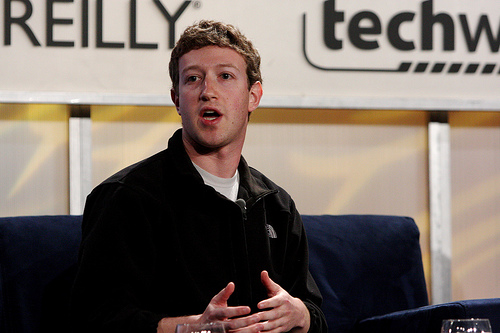Facebook、Twitter和Zynga创始人面临哪些道德拷问?
社交网络时代催生出了三家身价达数十亿美元的公司——Facebook、Twitter和Zynga。在Facebook和Twitter神话成为世人关注的焦点之时,其备受瞩目的创始人也时常遭遇各界的道德拷问。而耐人寻味的是,之前已因“ScamVille”事件而落下不道德口碑的Zynga首席执行官马克·平卡斯(Mark Pincus),现在却已无需面对这类麻烦。
ScamVille真的算是垃圾广告吗?毫无疑问,Zynga所采用的OfferPal等广告网站的服务,是一些不可安装的工具条,并总会诱使用户通过手机去注册这些订阅服务。但是许多财富500强企业不也总是采用垃圾邮件的方式投放广告吗?对科技行业的用户而言,“平卡斯运营ScamVille项目”这种消息看起来总是比“1-800-鲜花、Orbitz和必胜客采用垃圾广告战术”更吸引眼球。这就很容易给人留下平卡斯是一个垃圾信息艺术家的印象,并套用《FarmVille》和《CityVille》等Zynga知名游戏的名称,将其调侃为ScamVille。
平卡斯也确实坦言自己“做了大家所清楚的事情”以创造收益,但他绝不是指裁掉联合创始人等这类阴暗的事件。事实上,Zynga复制竞争对手的游戏、从EA等大型游戏公司挖角、在公司快速发展时期裁掉一些高管等事件也是Zynga发展史上难以翻过的一页。
平卡斯的这类做法现在已成为初创企业默认的行事准则,正如Dave McClure所称的那样,一个完美的初创企业必有一个推手、一位黑客、一名设计师。
但Twitter和Facebook创始人却并不像平卡斯这样幸运,他们至今仍面临源源不断的道德批判。Business Insider在上周曝料Twitter其实还有一名联合创始人Noah Glass的地位至今未得到承认。鲜有人了解Glass和Florian Weber也参与了创建Twitter的过程。他们俩人原本可以在自己有余力时再投入该项目的工作,或者自己成立一家公司,但他们并没有这么做,而是将其交给了江河日下的Odeo管理团队。后来埃文·威廉姆斯(游戏邦注:Evan Williams,Odeo的投资者之一,即后来的Twitter联合创始人兼CEO)收购了Odeo和Twitter项目,并告诉投资者这个项目没有前景,然后由此将Glass和Drosery排挤出去。在此事曝光后,威廉姆斯也承认“Glass在Twitter的地位一直没有得到承认”。
失去了真正联合创始人的Twitter也因此处于停滞发展的状态,并在其后数年都无法在照片和视频分享领域与Facebook平起平坐。现在的Twitter是一个活跃用户非常之少的播客网站,但有传言称重新归队的Jack Dorsey有计划振兴Twitter,使之成为面向大众用户、更具实用性的网站。
Facebook总是难免法律纠纷缠身的困扰,Paul Ceglia一直在向法院起诉,称自己才是该公司的创始人,但在公司合并后受到挤兑。
那么平卡斯为什么无法获得赞誉?Zynga一直就为硅谷精英所难容,因为它实际上是一家具有好莱坞风格,锁定各种大众用户,以追求利润为宗旨的娱乐公司,好莱坞明星Jeffrey Katzenberg最近也加入了Zynga董事会,这种现象更是印证了这一说法。硅谷公司与洛杉矶娱乐公司素有不和的传统,而Zynga却是一家充满洛杉矶文化而却背靠硅谷的企业。Zyng的恶名是复制他人创意?可好莱坞不也每天都在上演这一幕吗?看看最近扎堆出现的吸血鬼题材的影片就知道了。
我们并不是要指责扎克伯格、威廉姆斯是垃圾艺术家或者行为不端者,毕竟扎克伯格还非常年轻不够成熟,而威廉姆斯经历了Odeo的巨大失败才走到今天这一步,只是想说新兴行业的是是非非,实在是变幻莫测。(本文为游戏邦/gamerboom.com编译,转载请注明来源:游戏邦)
Zynga’s Mark Pincus: The ethical founder?
The social era of computing has produced three multi-billion dollar companies: Facebook, Twitter and Zynga. As light is increasingly shed on the formation myths of Facebook and Twitter, a lot of new information casts doubt on the ethics and motivations of their respective founders. It is ironic that Zynga has had no such drama, since the company’s founder Mark Pincus has been lambasted for being unethical due to what TechCrunch dubbed “ScamVille”.
Was ScamVille really a scam? There is no question that the offer ad networks like OfferPal that Zynga was using were shlocking uninstallable toolbars and illicitly signing people up for mobile subscriptions. However, numerous major Fortune 500 companies were also using scammy offers at the time, which TechCrunch itself later noted. As I have written before, TechCrunch has a repeated inclination to quash people’s reputations with tabloid-style posts. For the technology audience, “Marc Pincus is running ScamVille” is a whole lot more interesting than “1-800-Flowers, Orbitz and Pizza Hut are running scammy offers.” Many are left with the impression that Pincus is a scam artist, and the entire saga is branded ScamVille as if it were a Zynga property such as FarmVille or CityVille.
Yes, Pincus did in fact say that “he did everything horrible in the book” to get revenue. By horrible, he did not mean backstabbing people, arbitrarily chucking cofounders, and such. In fact, what he did was hustle, and hustle through one of the biggest economic downturns in the history of business. He did indeed use offer networks at the same time that they were popular with large reputable companies. He copied competitor’s games. He stole talent out of established gaming companies like EA. He replaced or demoted several executives as the company grew quickly.
The type of hustling Pincus did is now considered de rigueur for startups, with Dave McClure now stating that the perfect startup has a hustler, a hacker, and a designer.
In sharp contrast to Pincus, the founders of Twitter and Facebook are facing a continuing barrage of ethical questions. Last week, Business Insider revealed that Twitter had a largely unacknowledged co-founder, Noah Glass. It’s become apparent that while Jack Dorsey may have invented Twitter, Glass and Florian Weber were also instrumental in its creation. They could have just as easily worked on the project in their off hours and started a company on their own. Instead, they took it to the management team at the failing Odeo which was desperately looking for something new to do. It’s now reported that Ev Williams took the idea and early product, told their existing investors it wasn’t showing much promise, spun it out, unceremoniously dumped Glass, and quickly pushed out Dorsey. After those reports, Williams himself acknowledged that Glass “never got enough credit for his early role at Twitter.”
Twitter clearly stagnated without its true founders, and years later still does not properly embed photos and videos like Facebook does, and following a conversation thread is so painful that it is not even worth doing. Currently, Twitter is a primarily a broadcasting platform with very few active users. Lest I get flamed by Twitterphiles, newly returned Jack Dorsey’s plan to reinvigorate Twitter is to make it usable by normal people.
The lawsuits around Facebook’s formation keep piling up and it such a drama that it led to an award winning movie. Paul Ceglia is suing since he claims he funded the company in its early days but was cut out when it was reincorporated.
So why does Pincus get such a bad rap? There is no question that Zynga seriously annoys at least some members of the Silicon Valley digerati, myself included. Zynga is a Hollywood-style, hits-driven entertainment company whose target customer lives in the flyover states. So much so that Zynga has recently added Hollywood heavyweight Jeffrey Katzenberg to its board. There has long been a battle between Silicon Valley-based platform companies and Los Angeles-based entertainment companies, and Zynga is an LA-style company right in Silicon Valley’s backyard. Copying titles? Happens every day in Hollywood, as evidenced by the recent slew of vampire movies.
I am not saying that Zuckerberg and Williams are scam artists or unethical. Zuckerberg was very young and immature. Williams was under great duress through the collapse of Odeo. You can read the accounts and decide for yourself. However, I am questioning the taint that has followed Pincus. Given what we now know, which of the three would you rather be a cofounder with — Zuckerberg, Williams or Pincus? I know who I’d choose.(source:venturebeat)









































